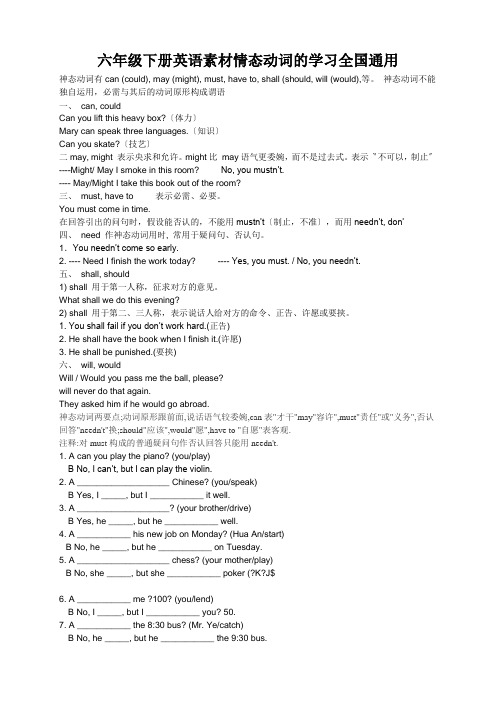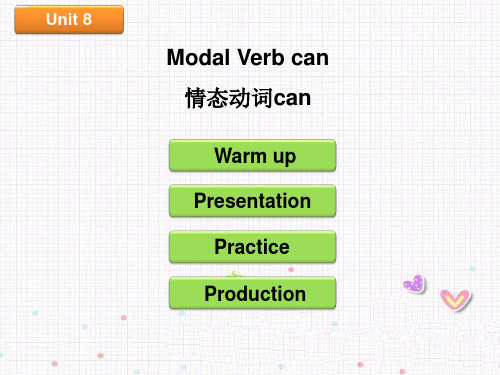全国通用六年级下册英语情态动词 (共12张PPT)
人教版(PEP)英语六年级下册情态动词can的用法课件

Say what can the peaple do.
play table tenis
ride a horse
who can ride a bike? who can not ride a bike?
ride a bike
fly 飞
Say what you can do and can't do.
01 warm up
eat
drink
sing dance
swim play football
sing dance
swim play football
She can sing.
He can swim.
swim
She can dance.
dance
play football
They can play football.
情态动词“can”的否定直接在can后面加not can not 表示不能,不会…… can not 可以缩写成can't
She can not sing. She can't sing. She can not dance.
She can't dance.
They can not play football.
They can't play football.
请写出下列句子的否定句。 The girl can dance. They can play basketball(篮球). We can speak English. Tony can play football. The boy can ride a horse(骑马).
情态动词“can”表示“能,会” 后面直接加动词表示能做……,会做……。
《情态动词》PPT课件

She could / was able to sing like an angel when she was a child.(过去一般的能力) (过去一般的能力) The fire spread through the hotel very quickly but everyone was able to get out. 过去有能力并且成功地做了某事) (过去有能力并且成功地做了某事) I could have worked out the problem, but I didn’t.(过去有能力但未做) (过去有能力但未做)
表示请求、允许、 表示请求、允许、允诺
1. 当对方是决策者时,你代表你(们)自己(I, 当对方是决策者时,你代表你( 自己( ,
We),或代表第三者(he,she,they)向对方 ),或代表第三者( ),或代表第三者 ) (you)请示或提出建议时用: )请示或提出建议时用: Shall / May (Might) / Can (Could) I / we....? Shall he / she / they...? Would / Will you...? Shall we begin our class? 我们开始上课吗? 我们开始上课吗? Shall the driver wait outside? 司机将在外面等 吗? When shall my father be able to leave hospital? 我父亲什么时候能出院? 我父亲什么时候能出院? Would you do me a favor? 你能帮我一个忙吗? 你能帮我一个忙吗?
表示推测——情态动词的重要用法. 情态动词的重要用法. 表示推测 情态动词的重要用法 对将来 对现在 对过去 ~+V ~+V ~ + have done/ 常见must be must be doing have been doing must/should 常见 可能的推测
六年级下册英语素材情态动词的学习全国通用

六年级下册英语素材情态动词的学习全国通用神态动词有can (could), may (might), must, have to, shall (should, will (would),等。
神态动词不能独自运用,必需与其后的动词原形构成谓语一、can, couldCan you lift this heavy box?〔体力〕Mary can speak three languages.〔知识〕Can you skate?〔技艺〕二may, might 表示央求和允许。
might比may语气更委婉,而不是过去式。
表示〝不可以,制止〞----Might/ May I smoke in this room? No, you mustn’t.---- May/Might I take this book out of the room?三、must, have to 表示必需、必要。
You must come in time.在回答引出的问句时,假设能否认的,不能用mustn’t〔制止,不准〕,而用needn’t, don’四、need 作神态动词用时, 常用于疑问句、否认句。
1.You needn’t come so early.2. ---- Need I finish the work today? ---- Yes, you must. / No, you needn’t.五、shall, should1) shall 用于第一人称,征求对方的意见。
What shall we do this evening?2) shall 用于第二、三人称,表示说话人给对方的命令、正告、许愿或要挟。
1. You shall fail if you don’t work hard.(正告)2. He shall have the book when I finish it.(许愿)3. He shall be punished.(要挟)六、will, wouldWill / Would you pass me the ball, please?will never do that again.They asked him if he would go abroad.神态动词两要点;动词原形跟前面,说话语气较委婉,can表"才干"may"容许",must"责任"或"义务",否认回答"needn't"换;should"应该",would"愿",have to "自愿"表客观.注释:对must构成的普通疑问句作否认回答只能用needn't.1. A can you play the piano? (you/play)B No, I can’t, but I can play the violin.2. A ___________________ Chinese? (you/speak)B Yes, I _____, but I ___________ it well.3. A ___________________? (your brother/drive)B Yes, he _____, but he ___________ well.4. A ___________ his new job on Monday? (Hua An/start)B No, he _____, but he ___________ on Tuesday.5. A ___________________ chess? (your mother/play)B No, she _____, but she ___________ poker (?K?J$6. A ___________ me ?100? (you/lend)B No, I _____, but I ___________ you? 50.7. A ___________ the 8:30 bus? (Mr. Ye/catch)B No, he _____, but he ___________ the 9:30 bus.改错1. She can't sings well.2. What dishes you can cook?3. Where do we can go today?May and may notMay I leave the room? Yes, you may.May we do? No, you may not. (No, you mayn't)依据情形和答句,用括号中的词提问。
情态动词-完整版PPT课件

1.情态动词的用法特点
1)情态动词 除 ought 和 have 外,后面只能 接不带to 的不定式。 2)情态动词没有人称,数的变化,即情态动 词第三人称单数不加-s。 3)情态动词没有非谓语形式,即没有不定式, 分词等形式。
can could may might shall should must will would ought to
have to dare need used to
表示推测
情态动词
不表示推测
2.表示推测——情态动词的重要用法.
情态动词
对将来
对现在
对过去
m肯ust/定sho的uld 推测
+ V. + V. + have done
常见must be + be doi定的推测 can’t, couldn’t
疑问的推测
can, could
+ V.
+ V.
+ have done
+ be doing
可以用not表示“可能不”
+V.
+ V.
+ have done
+ be doing
+ V.
+ V.
+ have done
+ be doing
不同的“肯定”程度可按下列层次排列: He is at home. (事实) He must be at home.(非常肯定的推断) He ought to be at home.(很可能) He could be at home.(很可能) He may be at home.(仅仅可能而已) He might be at home.(或许, 非常不确定) He might not be at home.(也许不在家) He may not be at home. (比might可能) He couldn’t be at home.(很可能不在家) He can’t be at home.(一定不在家)
情态动词全部ppt课件

A.must
B.would
C.should
D.might
19
• 翻译 • ----我能在这个房间抽烟吗? .
---- 可以。 ---- 不行,… ----Might/ May I smoke in this room?
---- Yes, you can.
---- No, you mustn’t
20
rule.
(威胁)
26
Shall 决心、承诺、警告、命令 you \he\she\they shall…..(二三人称陈述)
When the chairman turns up, nobody shall say a word. 命令 Students shall remain in their seats until the papers have been
28
5. should
1. should表示义务、职责、劝告,意 为 “应该”。
eg: You should keep your promise. Students should respect teachers.
29
2)表示说话人_惊_讶______等特殊情感。
It’s surprising that Mary should not know Lei Feng.
3.must, need没有时态,但有些情态动词如can、 may,will,have to有一般式和过去式的变化。
4. 情态动词不能单独做谓语,必须和实义动词原形 一起构成谓语。
3
情态动词的“时态”形式并不是时间区 别的 主要标志, 不少情况下, 情态动词的 现在式 形式和过去式形式都可用来表 示现在时 间、过去时间和将来时间。
小学英语语法课件-情态动词can PPT课件 全国通用

Dolphins can jump high and do tricks. Dolphins can’t fly. — Can dolphins see well and make lots of sounds? — Yes, they can. What can dolphins do?
小 学 英 语 语 法课件 -情态动 词can P PT课 件 全 国 通用
小 学 英 语 语 法课件 -情态动 词can P PT课 件 全 国 通用
Presentation
Sentences
1. 肯定句:主语+can +动词原形+其他 I can dance. 我会跳舞。
2. 否定句:主语+can’t+动词原形+其他 I can’t dance. 我不会跳舞。
3. 一般疑问句及回答:Can+主语+动词原形+其他? — Can you dance? 你会跳舞吗? — Yes, I can. / No, I can’t. 是的,我会。/不,我不会。
Sentences
He can’t be at home. 他不可能在家。 Can he come here today, please? 请问他今天能来这里吗?
can在句中表示可能,常用于否定句或疑问句中,指某种 可能性。
小 学 英 语 语 法课件 -情态动 词can P PT课 件 全 国 通用
小 学 英 语 语 法课件 -情态动 词can P PT课 件 全 国 通用
小 学 英 语 语 法课件 -情态动 词can P PT课 件 全 国 通用
Presentation
Sentences
Koalas and polar bears can climb fast and swim fast. Koalas and polar bears can’t fly. — Can koalas and polar bears eat fish and plants? — Yes, they can. What can koalas and polar bears do?
情态动词精品课件PPT课件
• It is usually warm in my hometown in March,but it can be rather cold sometimes.
• 我的家乡在三月份通常很暖和,但有时候也会相当冷。 • Mr.Bush is on time for ever ything.How can it be that he was late for the
meeting? • 布什先生做什么事情都很准时,他怎么可能开会迟到呢? • He can't be in the classroom ,for the light has been turned off. • 他一定不在教室里,因为灯已关了。
第23页/共52页
• 2.may用于肯定句中可以用来表示推测,意为“可能”;用于否定句中也可以表示 推测,may not意为“可能不”,表示一种不太确定的语气。may在疑问句中一般不 表示推测。
You'd better not. 等)不,你不可以用。
第11页/共52页
• 3.must和have to的用法 • must表示“必须、应该”。否定形式must not(mustn't)表示“不应该、不许可、
不准、禁止”等。在回答must的问句时,否定式常用need not(needn't)或don't have to表示“不必”,而不用must not,因为must not表示“禁止”。must表 示“一定、必定”等推测意义时,一般只用在肯定句中。 • The work must be finished as soon as possible. • 这项工作必须尽快完工。
第21页/共52页
• 热点考向二 情态动词表“推测”的用法 • 表示对目前或将来情况的推测往往用“情态动词+动词原形”这种结构。 • 1.can用于肯定句中表示可能性,意为“有时会”;用于疑问句中可以表示推测,意
情态动词(共43张PPT)
A.Must; mustn't
B.Will; couldn't
C.May; can't
( C ) It's really hot in the room.You'd better
the
windows. A.not to close B.don't close C.not close
(B )
—You
drive after drinking, Simon.
—You're right.I'll take a taxi.
A.wouldn't B.shouldn't C.ought to
二、用恰当的情态动词填空。
Simon, you mmuussttnn''tt play with the knife.You mmayay
在回答以 may 提问的问句时,肯定回答一般可仍用 may 或 Yes, please./Certainly./Sure./Of course.否定回答根据说话人的语气 由强到弱分别选用: mustn't/can't/may not。 —May I watch TV? 我能看电视吗? —No, you mustn't.You must play the piano first.不,你禁止看, 你必须先弹钢琴。
need 的基本用法 意为“需要;必要”,作情态动词时常用于否定句和疑问句中。 You needn't hand in your homework tomorrow.你明天不需要 交你的作业。 Need I attend the meeting this afternoon? 我需要今天下午参 加会议吗?
六年级下册英语课件-小升初专题总复习第三部分 词汇动词I—系动词、助动词、情态动词(共11张PPT)
2.助动词do(does,did) 助动词do(does,did)用于构成疑问句、否定句等结构.它们的 否定形式分别为do not=don't,does not=doesn't,did not= didn't.
【注意】(1)在一般现在时中,does用于第三人称单数,其余 一律用助动词do. (2)助动词do,does,did后用动词原形.如: I don't like winter.It's too cold.我不喜欢冬天,太冷了. John doesn't live in Beijing.约翰不住在北京. Did you go to the cinema last Sunday?上周日你去看电影了吗?
适当使用动画效果来突出重点或引导观众注意力, 但避免过多过滥.
控制切换速度
合理设置幻灯片之间的切换速度和方式,确保观众 能够跟上节奏.
考虑兼容性
注意动画和特效在不同设备和软件上的兼容性,避 免出现无法正常播放的情况.
04
幻灯片设计技巧
简洁美观幻灯片样式
选择简洁的模板
避免使用过于花哨的模板,选择简洁、大方的样式,突出内容主题.
注意力.
02
使用图表和图片
在PPT中使用图表和图片,可以更加直观地展示数据和内容,帮助观众更
好地理解PPT的内容.
03
强调关键词和短语
在PPT中强调关键词和短语,可以使得观众更加关注这些重点信息,提高
PPT的传达效果.
03
文字与图片运用
简洁明了文字表达
提炼核心信息
01
将复杂内容简化,突出重点和关键词,让观众快速抓住要点.
(三)情态动词的用法 情态动词词义不完整,不能单独作谓语,只能和动词原形构 成谓语,表示说话人的语气和情态.常见的情态动词如下:
小学英语六年级动词ppt课件
一般过去时:did
I don’t like English.
填空
1
1、 Do you like this magazine? 2、-What doesshe do at the weekends?
-She usually plays games with her friends.
注意:
(1)在一般现在时中,does用于第三人称 单数,其余一律用助动词do。
(2)助动词do,does,did后用动词原形。
为深入学习习近平新时代中国特色社 会主义 思想和 党的十 九大精 神,贯彻 全国教 育大会 精神,充 分发挥 中小学 图书室 育人功 能
助动词do
根据时态、主语人称、数的变化, do/ does/ did,
行为动词又称实义动词,表示动 作和状态
He speaksEnglish very well. 他英语讲得很好。
动词的基本形式 为深入学习习近平新时代中国特色社会主义思想和党的十九大精神,贯彻全国教育大会精神,充分发挥中小学图书室育人功能
原形 第三人称单数形式+s/es 现在分词+ing 过去式+ed
动 词:表示动作或状态的词。
• be动词(am, is,are)
动词 • 情态动词
• 助动词 • 行为动词
be动词 be动词:am,is,are, was, were be动词的否定形式: am not(没有缩略形式) are not=aren’t ,is not=isn’t 主语第一人称+am 主语第二人称+are 单数+is;复数+are
第三人称单数形式的变化
- 1、下载文档前请自行甄别文档内容的完整性,平台不提供额外的编辑、内容补充、找答案等附加服务。
- 2、"仅部分预览"的文档,不可在线预览部分如存在完整性等问题,可反馈申请退款(可完整预览的文档不适用该条件!)。
- 3、如文档侵犯您的权益,请联系客服反馈,我们会尽快为您处理(人工客服工作时间:9:00-18:30)。
三、用法
• • • • 1.can, could (1)表示能力,“能,会” Can you play basketball? (2)表示怀疑、猜测,常用于否定句和疑问 句中 • He can’t be in classroom. • (3)可以 • Can I help you?
• (4)could 是can的过去式,可以表示过去的 能力 • I could swim when I was seven years old. • (5)can开头的一般疑问句 以can和can’t回答 could开头的一般疑问句 以could和couldn’t 回答
• • 1. 2.
表示动作与状态的词 主要考点 动词分类 时态
动词种类
实义动词
系动词
情态动词
助动词
jumpdoes, can, must, did, be, may… have, has
1.---when did your uncle___in shanghai
一、情态动词
• • • • • • can, could must have to should will(would) may
二、特征
• 1.有一定词义,但不能单独作谓语,必须和行 为动词或系动词连用,构成谓语。 • 2.无人称和数的变化(have to例外:用于第三 人称单数时用has to) • He has to stay here. • 3.后面接动词原形 • She should stay at home.
A. wouldn't B. shall not C. won't D. shouldn't
7. ______ you be happy! A. May B. Can C. Must D. Would 8. Could I borrow your dictionary? Yes, of course you______. A. might B. will C. can D. should
A. won't...can't B. mustn't...may C. shouldn't, must D. can't...shouldn't
6. -Would you go out for a walk with me? -No, I ______ . My girl friend is coming.
• 注意:have to用于第三人称单数时用has to
1. May I stop my car here?
No, you_____.
A. can't B. mustn't C. needn't D. don't have to
2. Must we clean the house now? No, you _______. A. needn't B. may not C. mustn't D. can't
• • • • •
2.must (1)“必须 应该” (2)表推测“一定” (3)否定句中,mustn’t表示禁止,“不允许” Must开头的疑问句,肯定回答用must,否 定回答用needn’t(=don’t have to) “不需 要,不必”
• 3.have to • “have to+动词原形”:不得不做某事
4. You ________ return the book now. You can keep it next week if you like.
A. can't B. mustn't C. needn't D. may not 5. Johnny, you _______ play with the knife, you _______ hurt yourself.
7.-the radio___________that there will be another heavy rain in
Guangdong. _Too bad. It has rained for the whole week
A tells
B talks
C says
D speaks
8.It is nice of you to _________so much time showing me around your school A spend B cost C pay D take
---the day before yesterday A arrive B get C reach
2.As we know, some people are good at________but bad at give back
A lending B keeping C borrowing D using 3.The small child was not old enough to_________himself A have B wear C dress D put on 5. My brother and I are _____ TV. A watch B look C read D see 6.I ask Danny to________me my book, but he brough me his book A take B fetch C carry D match
